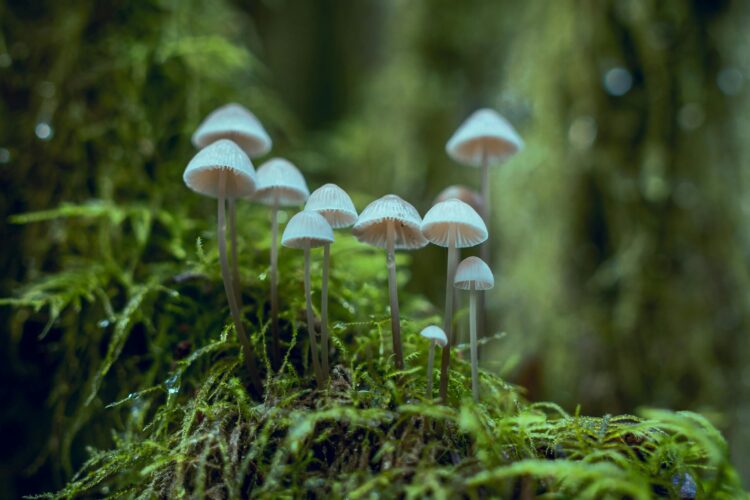Reading time: ~10 minutes
If anxiety has become your constant companion, you’re not alone. But what if one ancient molecule could help your mind find calm again? In this article, we’ll explore how psilocybin, the active ingredient in so-called magic mushrooms, may help rewire anxious brains.
In our fast-paced modern world, anxiety has become an all-too-common experience for many individuals.
Whether it’s due to the pressures of work, personal relationships, or the chaos of everyday life, anxiety can significantly impact one’s quality of life.
Recently, interest in alternative treatments for anxiety has surged, and one promising avenue is the use of psilocybin.
This post explores the potential mental health benefits of psilocybin in treating anxiety, particularly social anxiety and generalized anxiety disorders. We’ll also examine the scientific research supporting its use and discuss both the benefits and risks associated with psilocybin therapy.
The rise of psilocybin for anxiety treatment
Psilocybin mushrooms, a naturally occurring psychedelic compound found in certain mushrooms, has been used for centuries in various cultural and spiritual practices. In recent years, it has gained attention in the medical community for its potential therapeutic effects.
With the increasing prevalence of psychiatric disorders, there’s a growing interest in exploring psilocybin as a treatment option for anxiety.
What is psilocybin?
Psilocybin is a hallucinogenic compound found in over 200 species of mushrooms, commonly referred to as “magic mushrooms” or “shrooms.”
When ingested, psilocybin is converted into psilocin in the body, which then acts on serotonin receptors in the brain. This interaction can lead to altered perceptions, mood changes, and profound introspective experiences.
The science behind psilocybin for anxiety
Research on psilocybin’s effects on anxiety is still in its early stages, but preliminary studies have shown promising results.
One landmark study conducted by researchers at Johns Hopkins University found that psilocybin-assisted therapy significantly reduced anxiety and depression in patients with life-threatening cancer.
Another study published in the Journal of Psychopharmacology reported that a single dose of psilocybin produced sustained reductions in anxiety and depression in patients with life-threatening cancer.
These studies are part of a broader trend in clinical trials investigating the efficacy of psilocybin and other psychedelic drugs for various mental health conditions.
Benefits of psilocybin for anxiety
- Reduced anxiety symptoms: One of the most significant benefits of psilocybin therapy is its potential to reduce anxiety symptoms. Studies have shown that psilocybin can help alleviate feelings of worry, fear, and unease, leading to an overall improvement in mental well-being. This is particularly beneficial for individuals with generalized anxiety disorder (GAD), who experience persistent and excessive worry.
- Improved emotional regulation: Psilocybin has been found to enhance emotional regulation, which is crucial for managing anxiety. By influencing serotonin receptors, psilocybin can help individuals gain better control over their emotions, reducing the intensity and frequency of anxiety episodes. This can be especially helpful for those dealing with social anxiety disorder (SAD), where fear of social interactions can be debilitating.
- Enhanced self-awareness: Psilocybin therapy often leads to increased self-awareness and introspection. This heightened awareness can help individuals identify the root causes of their anxiety and develop healthier coping mechanisms. By gaining a deeper understanding of their thoughts and emotions, individuals can work towards long-term anxiety relief.
Risks and considerations
While psilocybin shows promise as a treatment for anxiety, it’s essential to consider the potential risks and limitations.
Psilocybin is a powerful psychedelic drugs, and its effects can be unpredictable, especially when used without proper guidance. It’s crucial to approach psilocybin therapy under the supervision of trained professionals in a controlled setting.
Some risks include mental health concerns such as exacerbation of pre-existing conditions or treatment-resistant depression in certain cases. Monitoring physiological aspects, such as blood pressure, can also be important during this process.
The legal landscape of psilocybin
The legal status of psilocybin varies worldwide. In some countries, it remains illegal, while others have decriminalized or allowed its use in therapeutic settings. In the Netherlands, for example, psilocybin-containing truffles are legal and used in controlled environments like the Essence Institute’s retreats. Understanding the legal framework in your region is essential before considering psilocybin therapy.
Psilocybin for social anxiety
Social anxiety disorder (SAD) is characterized by an intense fear of social situations and a constant worry about being judged or scrutinized by others. Traditional treatments for SAD include cognitive-behavioral therapy (CBT) and medication. However, psilocybin offers a novel approach by addressing the root causes of social anxiety.
Breaking the cycle of fear
Psilocybin can disrupt the negative thought patterns associated with social anxiety. By temporarily altering brain function, psilocybin allows individuals to break free from the cycle of fear and avoidance. This can lead to increased confidence and a willingness to engage in social interactions.
Fostering empathy and connection
One of the unique effects of psilocybin is its ability to foster empathy and connection. During a psilocybin experience, individuals often report feeling a deep sense of unity and understanding with others. This increased sense of empathy can help individuals with social anxiety develop healthier relationships and improve their overall social functioning.
Psilocybin and generalized anxiety disorder (GAD)
Generalized anxiety disorder (GAD) is characterized by excessive and uncontrollable worry about various aspects of life. Traditional treatments for GAD include therapy and medication, but psilocybin offers a complementary approach.
Addressing underlying trauma
For many individuals, anxiety is rooted in past trauma. Psilocybin therapy can facilitate the processing of traumatic experiences, allowing individuals to confront and release repressed emotions. By addressing these underlying issues, psilocybin can reduce the overall burden of anxiety.
Promoting neuroplasticity
Research suggests that psilocybin may promote neuroplasticity, the brain’s ability to reorganize and form new neural connections. This increased plasticity can lead to more adaptive thinking patterns and a reduction in anxiety symptoms. By enhancing the brain’s capacity for change, psilocybin can support long-term anxiety relief.
Psilocybin-assisted therapy
Psilocybin therapy typically involves a combination of psilocybin administration and therapeutic support. This approach ensures that individuals receive the necessary guidance and integration to maximize the benefits of the experience.
The role of set and setting
“Set and setting” refer to the mindset and physical environment in which a psilocybin experience takes place. A positive set and setting are crucial for a beneficial experience. Trained facilitators can help create a safe and supportive environment, ensuring individuals feel comfortable and secure during their psilocybin journey.
Integration and aftercare
Integration is the process of incorporating insights and experiences gained during a psilocybin session into everyday life. Aftercare support, such as therapy and group sessions, can help individuals make sense of their experiences and apply them to their ongoing mental health journey.
The future of psilocybin research
The field of psilocybin research is rapidly evolving, with numerous studies underway to explore its potential therapeutic applications. Ongoing research aims to better understand the mechanisms of psilocybin’s effects and identify the optimal conditions for its use.
Expanding access to the psychedelic experience
As research progresses, there is hope that psilocybin therapy will become more widely accessible. Some regions have already taken steps to decriminalize psilocybin and establish regulated therapeutic programs. These initiatives aim to provide safe and effective treatment options for individuals struggling with anxiety and other mental health disorders. The hope is to address both mental health concerns and specific conditions like obsessive compulsive disorder (OCD) and treatment-resistant depression.
Conclusion
Psilocybin holds significant promise as a treatment for anxiety, particularly social anxiety and generalized anxiety disorders. While further research is needed to fully understand its potential, preliminary studies and anecdotal evidence suggest that psilocybin can offer profound benefits for those seeking alternative treatments. However, it’s essential to approach psilocybin therapy with caution and under the guidance of trained professionals.
If you’re interested in exploring the potential of psilocybin for anxiety relief, consider joining a reputable retreat like those offered by the us. Our safe and supportive environment, combined with expert guidance, can help you start your healing process and unlock the potential benefits of psilocybin therapy.
Start your healing process now.
Frequently asked questions about psilocybin and anxiety
Can psilocybin help with anxiety?
Yes, growing research suggests that psilocybin may help reduce symptoms of anxiety, particularly in people with social anxiety or generalized anxiety disorder (GAD). When combined with professional guidance and proper integration therapy, psilocybin can promote emotional release, reduce fear-based thinking, and support long-term changes in how the brain processes stress. However, psychedelic therapy should always be done under professional supervision, as it’s not suitable for everyone.
Is it safe to use psilocybin for anxiety treatment?
Psilocybin therapy should only be used under the guidance of trained professionals in a controlled setting. While research suggests it can be safe and effective, there are potential risks, including adverse reactions and psychological distress.
How does psilocybin differ from traditional treatments for anxiety?
Traditional treatments for anxiety often focus on managing symptoms, while psilocybin therapy aims to address underlying causes and promote long-term relief.
Can psilocybin help with all types of anxiety disorders?
Research has primarily focused on social anxiety disorder and generalized anxiety disorder, but ongoing studies are exploring its potential for other types of anxiety disorders.


